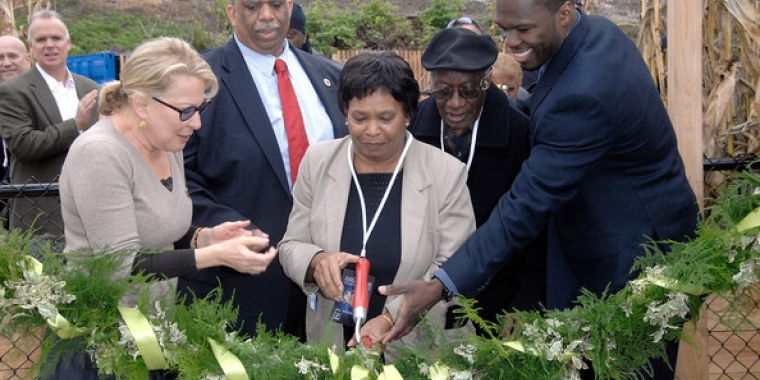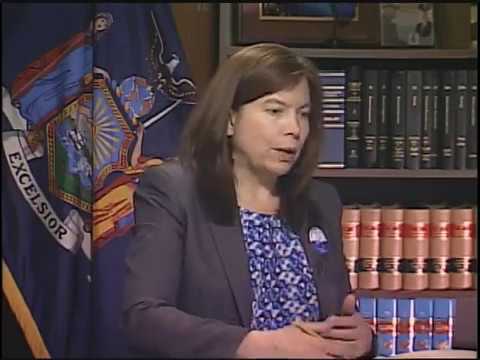
Senate Passes Legislation to Grow Community Gardens
Leroy Comrie
June 11, 2015

Senate Passes Legislation to Grow Community Gardens
(Albany, NY -- June 10th, 2015) Yesterday, the State Senate passed S5026-2015, legislation that would require the commissioner of Agriculture and Markets to convene the Community Gardens Task Force to issue reports on the progress of gardens across the State. The bill, sponsored by Senator Leroy Comrie (D-Hollis), passed unopposed 62-0.
Community gardens are shared pieces of land that are used for gardening by groups of local residents, usually transformed from neglected, vacant lots. On their own, these lots can pose a threat to quality of life, amassing trash, hosting criminal activity and producing health risks; in short: embodying and reflecting back for so many residents the hardships of urban life. Community Gardens take such spaces and re-imagine them: beautifying communities, providing food and bolstering morale.
Community Gardens are especially relevant for urban communities lacking access to reliable fresh food sources or grocers. For neighborhoods located in ‘food deserts’ like parts of Southeast Queens, community gardens can become a vital source of nutrition, pride and potentially even income for local residents. Community gardeners will consume more fruits and vegetables and be more physically and mentally fit. Gardens can foster a sense of communal stewardship, identity and ownership, provide educational opportunities, increase property values, and even help reduce crime.
Recognizing these benefits, in 1986 New York State enacted Title 2-C of the Agriculture and Markets Law relating to community gardens. This section of law created a task force to promote and foster the growth of community gardens, with the expectation that the task force fulfill a set of goals pertaining to the growth of gardens in local communities. However, the legislation failed to require substantive reporting from the task force. This bill would require the task force develop recommendations in such a report to be submitted every five years to the Governor and the legislature, holding it accountable to its role in the development of community gardens.
Senator Comrie welcomed the opportunity to create a road map for future growth. Comrie, who had worked as a City Council Member to address the need for improved wellness in the area, lauded the bill as a positive step forward in safeguarding diverse and healthy options for the South Queens community: “As someone who knows too well the unhealthy effects and challenges of obesity, I am committed to improving access to healthy food in my community, where fast food restaurants outnumber supermarkets and produce stores ten to one. This is one way to ensure we as lawmakers are doing what we can to work with the community so its people can thrive.”
“Access to quality food products are becoming increasingly difficult.” said Assembly Member Simanowitz (D-Kew Gardens Hills), who has introduced the bill as its prime sponsor in the Assembly. “While green markets fill some of the void, it is important to provide neighborhoods with the tools to grow their own fruits and vegetables. This legislation will finally address these needs by compelling the Community Gardens Task Force to convene and put forth recommendations to improve and create more community gardens.”
"Community gardens are a vital part of life in my Brooklyn Senate District," said Senator Velmanette Montgomery (D-Brooklyn), who is a co-sponsor of the bill. "The gardens offer an opportunity for my constituents to come together as neighbors to cultivate crops, provide nutritional sustenance for their families, and develop and nurture relationships through a common interest in gardening. I am proud to be a sponsor of Senator Comrie's legislation that appropriately charges the Task Force to report on the success of community gardens Statewide."
“The facts are out there: fresh fruits and vegetables are essential to a healthy lifestyle,” said Senator Marc Panepinto (D-Buffalo), another of the bill’s co-sponsors. “Limited access to those resources based on social or economic factors is unacceptable. The benefits of a community garden are ten-fold. Particularly in urban and low-income areas where these gardens provide nutritional, educational and social value for our residents. Unfortunately, little has been done to ensure their continued success. As elected lawmakers, it is our responsibility to make a change and even the playing field for all. The implementation of a community gardens task force will ensure their continued growth. My colleagues in the Senate, led by Senator Comrie, recognize the impact of community gardens. It is now up to the Assembly to do the same.”
Reports submitted from the Community Garden Task Force would include the number, nature and geographic location of community gardens across the State; a description of the costs, benefits and impacts of community gardens; an assessment of the success, failures and barriers in developing and expanding community gardens; lists of funding sources available to develop and expand community gardens, along with the requirements for obtaining said funding; an assessment of the funding required to double the number of community gardens Statewide, and a discussion on how best to meet that goal; recommendations for developing community gardens in food deserts; and any other recommendations or assessments the task force deems appropriate.
The bill was introduced today in the Assembly’s Agriculture Committee, where it is expected to pass.
For more information on community gardens near you, visit http://www.greenthumbnyc.org/gardensearch.html.
Share this Article or Press Release
Newsroom
Go to NewsroomComrie's Corner—March 21, 2017
March 30, 2017

THANKSGIVING ESSAYS AND CONTRIBUTIONS SD 14
November 22, 2016

Willie Burks
May 20, 2016

Audrey Sparks Fussa
May 11, 2016
